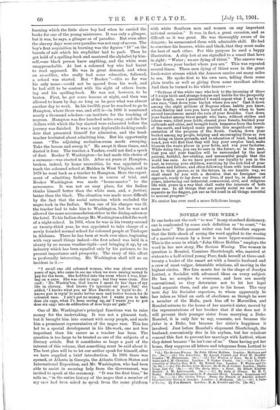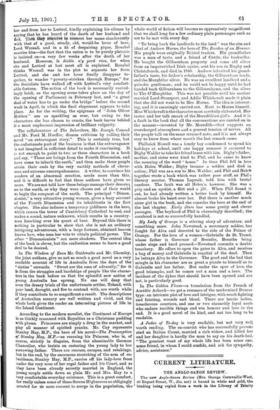NOVELS OF THE WEEK.*
IF one looks out the verb "to woo" in any standard dictionary, one is confronted by some such definition as "to court," "to make love." The present writer can but therefore suppos‘ that the little shock of seeing the word applied to the wooing of a married woman by a lover is mere hyper-sensitiveness. This is the sense in which." John Oliver Hobbes" employs the word in her new story, The Serious Wooing. The woman-in question is Rosabel, Countess Shortclough, who, married at sixteen to a half-witted young Peer, finds herself at three-and. twenty a leader of the smart set with a lunatic husband and a crew of most vulgar, detestable relations, all moving in the highest circles. Her fate meets her in the shape of Jocelyn Luttrel, a Socialist with advanced ideas on every subject. He has no scruples to overcome, and hers are merely conventional, so they determine not to let her legal bond separate them, and she goes to his house. The very next day his Socialist superiors, to whom apparently lie has taken as blind an oath of obedience as though he were a member of the Mafia, pack him off to Marseilles, and Rosabel returns to the house of her married sister, moved by the representations of her brother that if she does not it will prevent their younger sister from marrying a Duke. Rosabel, it is only fair to say, consents, not because the futur is a Duke, but because her sister's happiness is involved. Just before Rosabel's elopement Shortelough, the husband, conveniently dies in his asylum, but her relations conceal this fact to prevent her marriage with Luttrel, whom they detest because "he isn't one of us." Once having got her home, they suppress all letters and telegrams from Luttrel to • (1.) The Serious Wooing. By John Oliver Hobbes. London : Methuen and Co. [6s.]—(2.) The Inheritors. By Joseph Conrad and Ford M. Hueffer. London : W. Heinemann. [6s.]—(3.) The Wisdom of Esau. By R. L. Outh- waite and C. H. Chomley. London : T. Fisher Unwin. 188.]—(4.) The Pre- sumption of Stanley Hay, M.P. By Nowell Cay. London : F. Warne and Co. 13e. 6d.]—(5.) The Burden elan Honour. By B. St.-.T. Corbet. London : Digbh Long, and Co. [6e.)—(6.) The Early Stars a Novel. By Albert Kinross. Bristol : J. W. Arrowsmith. [8s.]—(7.) My Lady of Orange. By H. C. Bailey. With 8 Illustrations by Iti. P. Jacomb Hood. London : Longmans and Co. (68.)—(8.) The Golden Fleece. From the French of Amed:Se Achard. Illostmted by Victor A. Semiles. London : J. McQueen. [6s.]—(9.) A Judas of Talay. Ity Fox BusselL London : B. A. Everett and Co. N. 8d.] her and from her to Luttrel, kindly explaining his silence by saying that he has heard of the death of her husband and lied. Then thief fitiiittitt teSinciet her name slanderottly with that of a good, steady, old, would-be lover of hers, Lord Wroxall, and in a fit of despairing pique, Rosabel marries him—the fact that the union is to be purely platonic is insisted, on—a very few weeks after the death of her husband. However, is diable n'y perd rim, for when she and Luttrel at last meet all is explained. Rosabel thinks Wroxall was in the plot to separate her from Luttrel, and she and her lover finally disappear to- gether, to wander "poverty-stricken through Europe," for the Socialists have walked off with Luttrel's very comfort- able fortune. The action of the book is necessarily exceed- ingly brisk, as the opening scene takes place on. the day of the opening of Parliament in February last, and "a great deal of water has to go under the bridge" before the second week in April, in which the final elopement appears to take place. As for the writing, the epigrams of "John Oliver Hobbes" are as sparkling as ever, but owing to the characters she has chosen to create, the book leaves behind it a most unpleasant impression of brilliant vulgarity.
The collaborators of The Inheritors, Mr. Joseph Conrad and Mr. Ford M. Hueffer, disarm criticism by calling their novel " an extravagant story." This is certainly true, but the unfortunate part of the business is that the extravagance is not imagined in sufficient detail to make it convincing. It is not enough to point to two or three characters in a book and say, "These are beings from the Fourth Dimension, and have come to inherit the earth," and then make these people attain their ends by the very earthly methods of clever- ness and extreme unscrupulousness. A writer, to convince his readers of an abnormal creation, needs more than this, and it is difficult to feel that these authors have given us more. We are not told how these beings manage their descent on to the earth, or why they were chosen out of their world to begin the conquest of the earth. The principal " Dimen. sionist," a very attractive young woman, gives a hazy account of the Fourth Dimension and its inhabitants in the first chapter. She also induces a temporary giddiness in the hero, which causes the tower of Canterbury Cathedral to reel, and makes a sound, nature unknown, which results in a country- man knocking over his quart of beer. Beyond this there is nothing in particular to show that she is not an orainea7 intriguing adventuress, with a large fortune, obtained heaven knows how, who uses her wits to obtain political power. The other Dimensionists " are mere shadows. The central idea of the book is clever, but the realisation seems to leave a good deal to be desired.
In The Wisdom of Esau Mr. Outhwaite and Mr. Chomley, the joint authors, give us not so much a good novel as a very readable account of life in Australia from the days of the " sixties " onwards. "Sweet are the uses of adversity," for it Is from the struggles and hardships of people like the charac- ters in the book before us that the splendid new nation of young Australia has sprung. No one will deny that even the dreary trials of the unfortunate settler, Toland, with poor land,' drought, and fire to contend with, are worth while If they contribute to so magnificent a result. The descriptions of Australian scenery are well, written and vivid, and the whole book gives the reader an interesting picture of life in the Island Continent.
According to the modern novelist, the Continent of Europe is as thickly crammed with Royalties as a Christmas pudding with plums. Princesses are simply a drag in the market, and Play all manner of spirited pranks. Mr. Cay represents Stanley Hay, M.P., the hero of his novel—The Presumption of Stanley Hay, M.P.—as rescuing his Princess, who is, of course, strictly in disguise, from the abominable German Chancellor, who insists on restoring the young lady to her sorrowing father. There are rescues, escapes, and retakings, but in the end, by the enormous stretching of the arm of co- incidence, Stanley Hay, M.P., carries off his lady-love from under the very nose of her regal father and his Court, and as they have been already secretly married in England, the young couple settle down as plain Mr. and Mrs. Hay to a very comfortable everyday existence. This is a great comfort, for really unless some of these Serene Highnesses so obligingly created for tD3 soon consent to merge in the population, the whole world of fiction will become so oppressively magnificent that we shall long for a few ordinary plain personages such as are to be met with every day.
"To bring back the landlords to the land" was the aim and ideal of Andrew Hurne, the hero of The Burden of an Honour. His people were originally Bi istol traders. His grandfather was a man of taste, and a friend of Cottle, the bookseller. He bought the Gilburnham property and some old silver from an impoverished Irish squire, sent his son to Rugby and Christchurch, and died in 1840. Andrew inherited his grand- father's taste, his father's scholarship, the Gilburnham lands, and the Murghtlar silver. He was an excellent landlord and a quixotic gentleman; and he could not be happy until he bad handed back Gilburnham to the Gilburnhams, and the silver to The 0111urghtlar. This was not possible until his mother married Lord Stourport, and Addie Whicheraft made it plain that she did not want to be Mrs. Hurne. The idea is interest- ing, and it is amusingly carried out. Next to Hurne himself, Miss Whichcraft is the character most carefully elaborated. Her tastes and her talk smack of the Meredith Ian girl's. And it is a fault in the book that all the conversations are carried on in the manner—invented by Mr. Meredith—that suggests an overcharged atmosphere and a general tension of nerves. All the people talk on the same strained note, and it is not always easy to know from whose mouth the last remark came.
Philbrick Howell was a lonely boy condemned to spend his holidays at school, until one happy summer it occurred to Digby Welder to take his friend home with him. Digby's father, mother, and sister were kind to Phil, and he came to know the meaning of the word "home." In time Phil fell in love with Helen Welder; Digby became a soldier and died in action; Phil was as a son to Mrs. Welder; and Phil and Helen together wrote a book which was rather poor stuff, as Phil's literary mentor, Thomas Lapraik, told him with brutal candour. The fault was all Helen's, however. She was a prig and an egotist, a flirt and a jilt. When Phil found it out, he had already written a better book by himself. He almost broke his heart over her. But there is another much nicer girl in the book, and she consoles the hero at the end of the last chapter. Early Stars has some pretty and clever passages. The boyhood of Phil is charmingly described; the manhood is not so successfully handled.
My Lady of Orange is a stirring story of adventure, and something more. John Newstead, a mercenary soldier, has fought for Alva and deserted to the side of the Prince of Orange. For the love of a woman—G'a'brielle de St. Trend, whose father is Governor of Breuthe, Brenthe being under siege and hard pressed—Newstead commits a double treachery. He offers to open the gates to Alva, and receives a bag of money an Gabrielle in requital Of the deed. Then he betrays Alva to the Governor. The good and the bad that mingle in his character are as great a puzzle to himself as to Gabrielle and her father. But under the spur of love, the good triumphs, and he comes out a man and a hero. The incident of the dykes that should have been opened and are not, is particularly good.
In The Golden Fleece—a translation from the French of Amedee Achard—we get a romance of the modernised Dumas type: an intricate plot of love and intrigue, with much fighting and fainting, wounds and blood. There are heroic ladies, treacherous courtiers, and one or two staunchly loyal souls who endure terrible things and win honour and love in the end. It is a good novel of its kind, and not too long to be readable.
A Auks of To-day is very readable, but not very well worth reading. The ex-convict who has successfully person: ated an Italian Count, married a rich widow, and killed her and her daughter is hardly the man to say on his death-bed, "The S greatest want of my whole life has been sonie one, some friend, in whom I could confide, and ask for sympathy, advice, assistance."







































 Previous page
Previous page